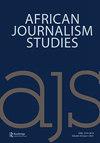将言论自由置于人类尊严之上:促进或削弱新闻业——以津巴布韦为例
IF 1.1
3区 文学
Q3 COMMUNICATION
引用次数: 0
摘要
摘要2014年,宪法法院认为,根据津巴布韦2013年新宪法,言论自由可能必须被视为人类尊严的附属,本研究分析了这对新闻实践的影响。该研究认为,此举将破坏监督新闻业,从而限制人们接受信息的言论自由权。这是基于对津巴布韦言论自由判例的文本分析,该判例表明,目前有利于保护当权者的声誉。因此,将言论自由置于人的尊严之下可能意味着恶化本已糟糕的局势。本文章由计算机程序翻译,如有差异,请以英文原文为准。
Subordinating Freedom of Expression to Human Dignity: Promoting or Undermining Journalism—A Case of Zimbabwe
ABSTRACT Motivated by a 2014 Constitutional Court opinion that under Zimbabwe’s new constitution of 2013, freedom of expression might have to be considered as subordinate to human dignity, the study analyses the implications of this on journalistic practice. The study argues that such a move would undermine watchdog journalism, thereby limiting people’s freedom of expression right to receive information. This is based on a textual analysis of Zimbabwe’s freedom of expression jurisprudence, which shows that currently the odds are in favour of protecting the reputation of those in power. Thus, subordinating freedom of expression to human dignity might mean worsening an already bad situation.
求助全文
通过发布文献求助,成功后即可免费获取论文全文。
去求助
来源期刊

African Journalism Studies
COMMUNICATION-
CiteScore
1.90
自引率
10.00%
发文量
18
期刊介绍:
Accredited by the South African Department of Higher Education and Training for university research purposes African Journalism Studies subscribes to the Code of Best Practice for Peer Reviewed Scholarly Journals of the Academy of Science of South Africa. African Journalism Studies ( AJS) aims to contribute to the ongoing extension of the theories, methodologies and empirical data to under-researched areas of knowledge production, through its emphasis on African journalism studies within a broader, comparative perspective of the Global South. AJS strives for theoretical diversity and methodological inclusivity, by developing theoretical approaches and making critical interventions in global scholarly debates. The journal''s comparative and interdisciplinary approach is informed by the related fields of cultural and media studies, communication studies, African studies, politics, and sociology. The field of journalism studies is understood broadly, as including the practices, norms, value systems, frameworks of representation, audiences, platforms, industries, theories and power relations that relate to the production, consumption and study of journalism. A wide definition of journalism is used, which extends beyond news and current affairs to include digital and social media, documentary film and narrative non-fiction.
 求助内容:
求助内容: 应助结果提醒方式:
应助结果提醒方式:


